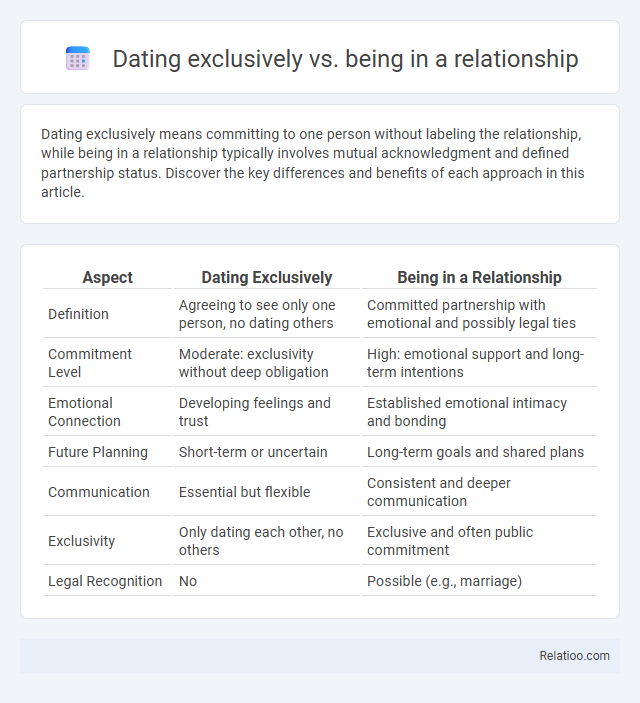Dating exclusively means committing to one person without labeling the relationship, while being in a relationship typically involves mutual acknowledgment and defined partnership status. Discover the key differences and benefits of each approach in this article.
Table of Comparison
| Aspect | Dating Exclusively | Being in a Relationship |
|---|---|---|
| Definition | Agreeing to see only one person, no dating others | Committed partnership with emotional and possibly legal ties |
| Commitment Level | Moderate: exclusivity without deep obligation | High: emotional support and long-term intentions |
| Emotional Connection | Developing feelings and trust | Established emotional intimacy and bonding |
| Future Planning | Short-term or uncertain | Long-term goals and shared plans |
| Communication | Essential but flexible | Consistent and deeper communication |
| Exclusivity | Only dating each other, no others | Exclusive and often public commitment |
| Legal Recognition | No | Possible (e.g., marriage) |
Understanding Dating Exclusively
Dating exclusively involves mutual agreement between two people to focus solely on each other without dating others, creating a foundation of trust and commitment. It differs from being in a relationship, which often implies a deeper emotional connection and defined status, while exclusivity emphasizes the prevention of outside romantic involvement. Understanding dating exclusively helps clarify expectations, prevent misunderstandings, and build a stronger emotional bond early in the dating process.
Defining a Committed Relationship
Defining a committed relationship involves understanding the nuances between dating exclusively and exclusivity itself, where dating exclusively means seeing only one person but not yet labeling the relationship. Exclusivity refers to a mutual agreement to refrain from dating others, signaling a clear commitment that differs from casual dating. Your clarity about these terms helps establish trust and sets the foundation for a committed partnership with defined expectations.
Key Differences: Exclusive Dating vs Relationships
Exclusive dating involves two people agreeing to see each other without dating others, often as a preliminary stage to assess compatibility, while being in a relationship implies a deeper emotional commitment, shared responsibilities, and future planning. Exclusivity signifies a mutual understanding to limit romantic involvement to one another, yet it can differ in terms of commitment level, where exclusive dating may lack the formal commitment found in established relationships. Key differences between exclusive dating and relationships include the intensity of emotional investment, clarity of long-term intentions, and acknowledgment of partnership status.
Emotional Expectations in Each Stage
Dating exclusively often involves early emotional investment with an emphasis on building trust and understanding boundaries, setting the stage for deeper connection. Being in a relationship typically demands a higher level of emotional commitment, consistent communication, and mutual support to sustain long-term intimacy and stability. Exclusivity signifies a mutual agreement to prioritize each other's emotional needs, fostering security, loyalty, and a shared vision for the future.
Communication: Clarifying Your Status
Clear communication is essential when dating exclusively, being in a relationship, or establishing exclusivity to ensure both partners understand their status and expectations. You should openly discuss boundaries, intentions, and feelings to prevent misunderstandings and foster trust. Defining your status clarifies commitment levels and supports emotional security for both individuals.
Signs You’re Ready to Transition
Recognizing the signs you're ready to transition from dating exclusively to being in a committed relationship involves increased emotional intimacy, consistent communication, and a mutual understanding of future goals. Your willingness to prioritize the partner's needs alongside your own and feeling secure in vulnerability often indicates readiness for exclusivity. Observing these key behaviors helps ensure that both partners align on commitment expectations and relationship boundaries.
Common Misconceptions About Exclusivity
Exclusivity in dating is often misunderstood as synonymous with being in a formal relationship, but it primarily refers to the mutual agreement to focus on one person without necessarily defining the relationship. Many believe that exclusivity implies immediate commitment, yet it can serve as a transitional phase where partners explore emotional connection and boundaries. Clarifying these distinctions helps couples avoid miscommunication and build trust based on shared expectations rather than assumptions.
Benefits and Challenges of Dating Exclusively
Dating exclusively offers the benefit of deepening emotional intimacy and building trust, allowing you to focus on one person without distractions. Challenges include navigating expectations and potential pressures for commitment, which require clear communication to avoid misunderstandings. Unlike being in a relationship, dating exclusively may lack formal commitment but still provides a foundation for exploring compatibility and mutual respect.
Navigating Boundaries and Trust
Navigating boundaries and trust is crucial when moving from dating exclusively to being in a committed relationship, as clear communication helps define mutual expectations and emotional needs. Establishing exclusivity signals a commitment to fidelity and deepens trust, allowing you to build a secure foundation while respecting personal space and individual growth. Your ability to openly discuss limits and desires strengthens intimacy and fosters a healthy dynamic essential for lasting connection.
Making the Shift: From Exclusive Dating to Relationship
Making the shift from exclusive dating to a committed relationship involves clear communication about intentions and boundaries to foster mutual understanding and trust. Exclusive dating emphasizes consistent one-on-one interactions without defined expectations, while a relationship formalizes emotional investment, future planning, and often introduces shared responsibilities. Establishing exclusivity early can smooth this transition, allowing both partners to align on commitment goals and deepen emotional connection.

Infographic: Dating Exclusively vs Being in a Relationship
 relatioo.com
relatioo.com